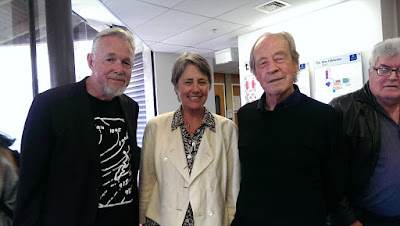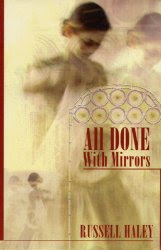Jan Kemp. Dancing Heart: New and Selected Poems 1968–2024. Edited by Jack Ross. ISBN 978-3-00-083163-8. Kronberg im Taunus, Germany: Tranzlit, 2025. 172 pp.
I've just this morning received my co-author's copies of this, Jan Kemp's latest collection - a selection I made last year from her poetry to date. And here we both are on the back cover: snapped at an unguarded moment in the Senior Common Room of Auckland Uni during Jan's latest visit to New Zealand.
Blurb:
Jan Kemp MNZM & Dr Jack Ross first worked together 20 years ago creating the Aotearoa NZ Poetry Sound Archive (2004). Since then Jan has published three poetry collections, Dante’s Heaven (Puriri Press, 2007) which became Dante Down Under (English/German) (2017), and Black Ice & the Love Planet (English/German) (2020), both from Tranzlit & Tripstones (Puriri Press, 2020), as well as the two memoirs Raiment (Massey University Press, 2022) and To see a World (Tranzlit, 2023). She lives with her husband Dieter Riemenschneider in Kronberg im Taunus, Germany, where she sings in a choir, presents poetry & music performances and walks in its parks.None of that tells you very much about the book itself, though. I've written some comments on Jan's previous collection, Tripstones, here. That, too, was a selection from already published poems, but it was meant as a short, limited-edition sampler from her longtime publisher Puriri Press rather than a genuine attempt to do justice to the scope and scale of her work to date.
Jack, too, has published three poetry collections since 2004: To Terezín (Massey University, 2007); A Clearer View of the Hinterland: Poems & Sequences 1981-2014 (HeadworX, 2014), and The Oceanic Feeling (Salt & Greyboy Press, 2020); as well as Celanie (Pania Press, 2012), a collaboration with artist Emma Smith, which includes a translation of Paul Celan’s poems to his wife Gisèle Celan-Lestrange. He was also managing editor of Poetry NZ (now Poetry Aotearoa) from 2014 to 2020. He lives in Mairangi Bay, on Auckland’s North Shore, with his wife, crafter, curator and art-writer Bronwyn Lloyd.
Jan's nine poetry collections to date contain, by my estimate, 355 poems, composed over a period of roughly fifty years. All of them could all be fitted in one book, I suppose, but it would have to be a pretty massive tome. We therefore decided, when discussing the idea of a collected / selected edition of her poetry, to compromise on presenting a set of new, unpublished poems alongside a selection from her earlier books.
As I say in my introduction to Dancing Heart:
Each one of these books is a thing of beauty. They speak to the typefaces and design features of a particular epoch: the ampersands and back-slashes of the 1970s, the florid exuberance of the early 2000s.Here's a gallery of covers to make the point:
As I go on to say in my introduction:
I suppose if I had to play favourites, it would have to be for the meticulously designed and produced volumes created by John Denny at the Puriri Press in Auckland. The Sky’s Enormous Jug, with its delicate hand-binding and sumptuous illustrations, is a particular pleasure to leaf through. Dante’s Heaven, too, is a wonderful piece of book-art.I'm very happy to report that John Denny has come out of retirement to design this new collection as a special favour to Jan.
What else? If you'd like to preview the table of contents and find out more information about the book, please go here. If you'd like to read my introduction in full, you can go here. There's a sample poem, "Christmas Lily", available here at Newsroom.
And if you're interested in ordering a copy, this is the address to write to:
Available:
Tranzlit
Bahnhofstrasse 16a
61476 Kronberg im Taunus
Germany
www.tranzlit.de
E: jantranzlit@gmail.com
RRP: $NZ35 [incl. postage & packing]
I hope you'll have as much fun reading the book as we did in putting it together. It involved digitising, collating, and selecting from all of Jan's books - a task we've both had to work hard on over the past year - but it was definitely worth it. As I say in my introduction:
As I look at my set of her books to date, including all nine of her poetry collections, published between 1976 and 2020, they seem like a time capsule of New Zealand writing over the past five decades.In the end, though:
if it’s to live, your work does have to end up belonging to others.
Jan has understood this, and her lifetime of poetry writing, reading, performing and teaching has – in my view at least – resulted in a truly wonderful body of work, which I believe richly deserves to catch fire in the minds of new readers as well as the memories of already established fans.
Books I own are marked in bold:
-
Poetry collections:
- Against the Softness of Woman (1976)
- Against the Softness of Woman. Dunedin: Caveman Press, 1976.
- Diamonds and Gravel (1979)
- Diamonds and Gravel. Wellington: Hampson Hunt, 1979.
- The Other Hemisphere (1991)
- The Other Hemisphere. 1991. Washington, DC: Three Continents Press, 1992.
- The Sky’s Enormous Jug – love poems old and new (2001)
- The Sky’s Enormous Jug – love poems old and new. Auckland: Puriri Press, 2001.
- Only One Angel (2001)
- Only One Angel. Dunedin: University of Otago Press, 2001.
- Dante’s Heaven (2006)
- Dante’s Heaven. Auckland: Puriri Press, 2006.
- Dante Down Under / Gedichte aus Aotearoa/Neuseeland. 2006. Trans. Dieter Riemenschneider. Kronberg im Taunus: Tranzlit, 2017.
- Dante's Heaven / Il Cielo di Dante. 2006. Trans. Aldo Magagnino. Poggio Imperiale: Edizioni del Poggio, 2017.
- Voicetracks: Poems 2002-2012 (2012)
- Voicetracks: Poems 2002-2012. Auckland: Puriri Press / Kronberg im Taunus: Tranzlit, 2012.
- Tripstones: A Selection of Poems (2020)
- Tripstones: A Selection of Poems. Auckland: Puriri Press, 2020.
- Black Ice & the Love Planet (2020)
- Black Ice & the Love Planet: Poems 2012-2019 / Glatteis & der Planet der Liebe: Gedichte 2012-2019. Trans. Susanne Opfermann & Helmbrecht Breinig. Kronberg im Taunus: Tranzlit, 2020.
- Black Ice & the Love Planet: Poems 2012-2019 / Ghiaccio Nero & il Pianeta dell'Amore: Poesie 2012-2019. Trans. Aldo Magagnino. Poggio Imperiale: Edizioni del Poggio, 2021.
- Dancing Heart: New and Selected Poems. Ed. Jack Ross (2025)
- Dancing Heart: New and Selected Poems 1968–2024. Edited by Jack Ross. ISBN 978-3-00-083163-8. Kronberg im Taunus, Germany: Tranzlit, 2025.
- [Contributor] The Young New Zealand Poets. Ed. Arthur Baysting. Auckland: Heinemann Educational Books, 1973.
- [Contributor] Private Gardens: An Anthology of New Zealand Women Poets. Ed. Riemke Ensing. Afterword by Vincent O'Sullivan. Dunedin: Caveman Publications Ltd., 1977.
- [Featured Poet] Climate 29: A Journal of New Zealand and Australian Writing (Autumn 1979). Ed. Alistair Paterson. Auckland, 1979.
- Ice Breaker Poems. Drawings by Anthony Stones. Auckland: Coal-Black Press, 1980.
- Five Poems. Singapore: National Museum Art Gallery, 1988.
- Nine Poems from Le Château de Lavigny. Auckland: Puriri Press, 2007.
- Jennet's poem: wild love. Auckland: Puriri Press, 2012.
- [Featured Poet] Poetry NZ 48 (2014). Ed. Nicholas Reid. Auckland: Puriri Press / Palm Springs, California: Brick Row, March 2014.
- Spirals of Breath: Short Stories & Novellas. Kronberg im Taunus: Tranzlit, 2020.
- Raiment. Memoirs, 1. Auckland: Massey University Press, 2022.
- To See a World. Memoirs, 2. Kronberg im Taunus: Tranzlit, 2024.
- [with Jonathan Lamb & Alan Smythe] New Zealand Poets Read Their Work. 3 LPs. Auckland: Waiata Records, 1974.
- [with Jack Ross] Classic New Zealand Poets in Performance [with 2 CDs]. Auckland: Auckland University Press, 2006.
- [with Jack Ross] Contemporary NZ Poets in Performance [with 2 CDs]. Auckland: Auckland University Press,, 2007.
- [with Jack Ross] New New Zealand Poets in Performance [with 2 CDs]. Auckland: Auckland University Press, 2008).
- [with Dieter Riemenschneider] Wildes Licht: Poems / Gedichte aus Aotearoa Neuseeland (English-German). Kronberg: Tranzlit, 2010.
Chapbooks & Features:
Prose:
Edited:





































.jpg)






